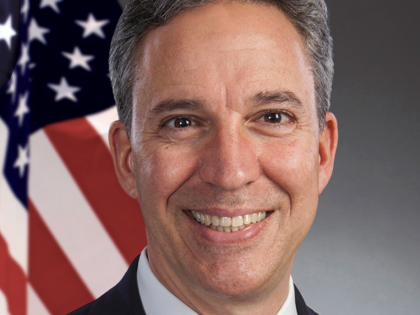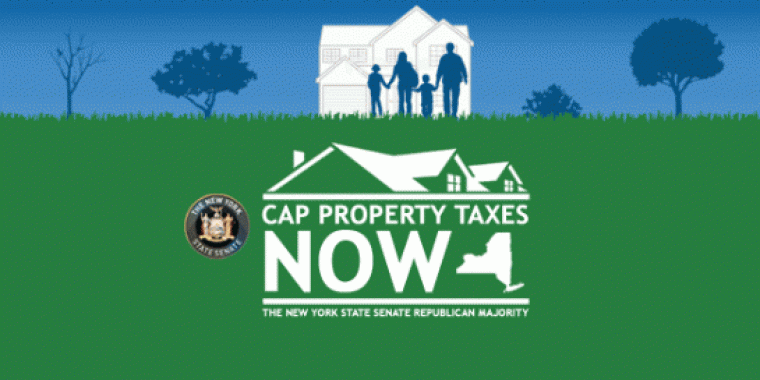
Senate Passes Property Tax Cap Legislation
Jack M. Martins
January 31, 2011
-
ISSUE:
- Property Tax

The New York State Senate today passed property tax relief legislation (S.2706) that places a cap on the growth of school and local government property tax levies at two percent or the Consumer Price Index (CPI), whichever is less. New York would become the 44th state to cap local property taxes. In addition, the Senate approved two measures related to providing mandate relief to school districts and local governments.
“With this bill we are keeping our commitment to provide real property tax relief to homeowners across the state who are sick and tired of paying the highest property taxes in the nation,” Senate Majority Leader Dean G. Skelos said. “I applaud Governor Cuomo for making the cap a priority. The Senate is ready to put it in law, now we need the Assembly to join us in passing this measure so we can stop the dramatic growth in property taxes and provide the relief that taxpayers desperately need.”
Senator Jack Martins (R-C-I, Mineola) called the legislation a good first step to easing the property tax burden on Long Islanders include residents and business owners in the 7th Senate District. "Simply stated, the passing of a tax cap was a promise made and a promise kept to the people,” Senator Martins said. “In order to make government work again for the people, we need fiscal discipline and commitment to initiatives like a tax cap. Families have to live within a budget and cut spending when times are tough. Government has to take a lesson from kitchen table budgeting of working families and ignore special interest budgeting."
The bill includes the following provisions:
> A school district's tax levy limit, excluding the taxes necessary to support the local share of capital expenditures, could increase by up to the lesser of two percent or the annual increase in the consumer price index ("CPI");
> A school district would be allowed to carry over unused tax levy capacity from the prior year, but could use this carryover levy capacity to increase its tax levy only an additional 1.5% in any year; and
> In the event a district's actual tax levy exceeds its authorized levy due to clerical or technical errors, the erroneous excess levy must be placed in reserve to offset the levy for the next school year.
> A school district would be required to submit a tax levy proposition for approval by voters at the district's annual meeting on the 3rd Tuesday in May. If the proposed tax levy is within the district's tax levy limit, then a majority vote would be required for approval. If the proposed tax levy exceeds the district's tax levy limit, then the vote threshold required for approval would be 60 percent.
> If the tax levy proposition is defeated, then the district would be required to submit a second levy proposition for approval, that complies with its tax levy base, by voters at a district meeting held on the 3rd Tuesday in June. If the proposed tax levy is within the district's tax levy limit, then a majority vote would be required for approval. If the proposed tax levy exceeds the district's tax levy limit, then the vote threshold required for approval would be 60 percent.
> If the second proposition is defeated, then the district would be required to adopt a tax levy that is no greater than the prior school year.
If enacted, the law would take effect for the 2012-13 school year.
The bill also provides for the same cap to apply to taxes levied by municipal governments. Local governments that do not levy an amount up to the cap in one year can rollover that amount up to 1.5 percent in the following year.
The property tax cap legislation has tremendous support, not only among taxpayers throughout the state, but among major business organizations.
Kevin S. Law, President and CEO of the Long Island Association said: "Senate Majority Leader Skelos and the Long Island Senate delegation are to be applauded for passing this property tax cap legislation. This is a critical first step in relieving the property tax burden and needs to be joined by a reduction in unfunded mandates on our local governments. Reducing the tax burden on the business community is an important facet in getting this stagnant economy moving again."
MANDATE RELIEF MEASURES
The Senate today also passed mandate relief legislation (S.2707), sponsored by Senator Steve Saland (R-I-C, Poughkeepsie), that would require any state mandated program imposed on municipalities or school districts, which created any net additional cost in excess, to be funded by the state.
“We need a responsible government, both at the federal and state levels, that considers costs before imposing mandates and strives to address the current fiscal burdens. When schools and local governments are saddled with unfunded mandates, taxpayers are saddled with higher taxes. If we expect municipalities and school districts to function within the confines of a tax cap, the State should be doing all that it can to give them the flexibility to operate efficiently, which should include the removal of various costly and onerous existing mandates,” Senator Saland said.
In addition to the property tax cap legislation, the Senate approved a resolution, sponsored by Senator Martins urging the Governor and his Mandate Relief and Medicaid Redesign Teams, to provide lasting and meaningful real property tax relief.
"Mandate relief and a tax cap go hand in glove. Mandate relief for our localities and schools is like an oasis in the desert of government,” Senator Martins said. “Today, we are taking the initiative and finally giving the people the reform they've cried out for. For me, this resolution is a real commitment to an issue that will have a profound impact on the communities I represent."
Specifically, the resolution urges the mandate relief panel to:
> Focus on New York’s service delivery structure that requires school districts, local governments and other local taxing districts to administer and fund mandated programs;
> Look for ways to reduce the costs of mandated programs on schools and local governments by determining how school districts and local governments may be given greater ability to control costs;
> Examine the reason for delays in state reimbursement for mandated programs;
> Consider the practice of cost-shifting of mandated programs; and
> Identify opportunities for eliminating or reducing unfunded and underfunded mandates imposed by the New York State government on local governments and school districts.
The resolution also urges the Governor’s Medicaid redesign panel to work with Medicaid stakeholders to conduct a comprehensive review of the state’s Medicaid program, and make recommendations for cost saves and quality improvement measures to meet specific budget reductions for Medicaid spending.
The two bills approved today will be sent to the Assembly.
Share this Article or Press Release
Newsroom
Go to NewsroomSenator Martins' Toy Drive 2025
November 10, 2025

Fill a Backpack Program
June 10, 2025


